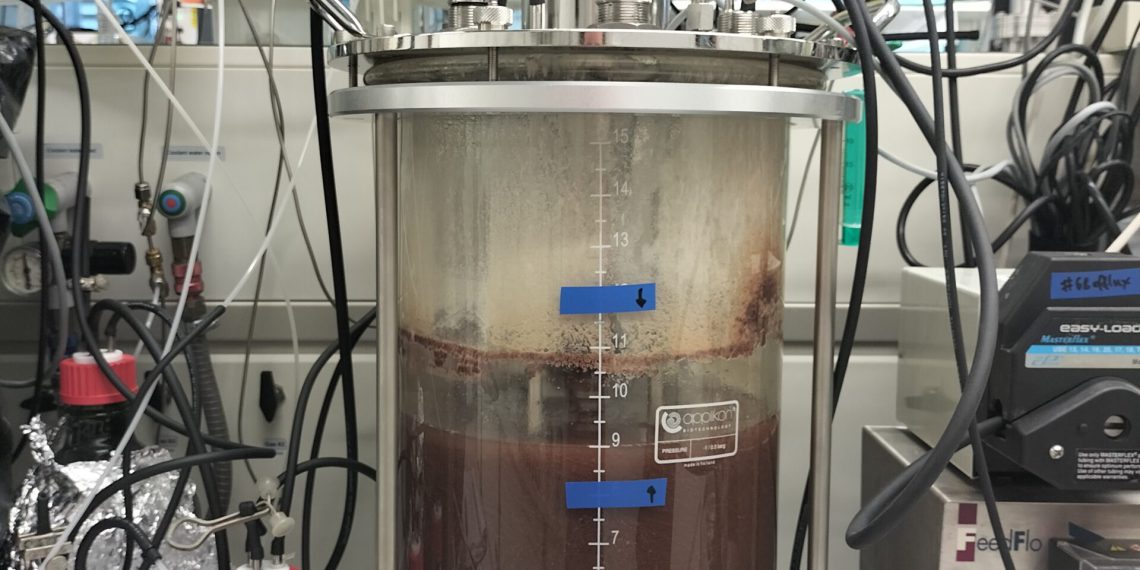Microbiologist Dr. Cornelia Welte received the 15th VAAM Research Award for her research on the microbial methane cycle from Radboud University in Nijmegen, the Netherlands. She studies the conversion of methane from the molecule to the ecosystem, providing valuable insights for environmental processes and biotechnological applications. The 10,000-euro prize will be awarded by the Association for General and Applied Microbiology (VAAM) for outstanding recent work in the field of microbiology at its online annual meeting on February 21, 2022.
Microbes can both produce and decompose the greenhouse gas methane and thus contribute significantly to climate effects. Cornelia Welte’s research group studies these microbial processes, combining microbiology, biochemistry, physiology and biotechnology. For example, she discovered that a previously unknown organism, Methermicoccus shengliensis, converts constituents from coal seams and oil deposits into methane. The group optimized the cultivation conditions for this challenging microbe and created a map of its metabolic pathways using modern analytical methods. These findings, along with purified enzymes for methane formation, could be the basis for industrial applications, such as the microbial conversion of coal or oil residues to biogas.
Welte’s group is also studying microorganisms that break down methane. Some of these little-studied archaea — single-celled organisms that often live in extreme conditions — can help reduce global methane emissions. Knowledge of their metabolic processes and the enzymes required for this is an important basis for their targeted use. Welte’s group has succeeded in using these microorganisms to produce electricity from methane.
“Anaerobic methanotrophic archaea could thus remove methane from wastewater in the future, for example.”
- Dr. Cornelia Welte
In her adopted home country of the Netherlands, Welte recently achieved attention with a study of methane formation in Amsterdam canals: “For a shallow body of water, methane emission there is surprisingly low — thanks to a high number of methane-degrading microbes on the canal walls.” In the process, the group also discovered a previously unknown methane-degrading bacterium, methyloglobulus, which may obtain important micronutrients from the stones of the canal walls.
Contaminants in water are the subject of another current study, which is investigating whether and how microbes can help break down hazardous substances such as pharmaceuticals from wastewater in municipal sewage treatment plants.
The group’s ecological work also includes symbioses of microbes and insects: For example, it was able to show that microorganisms play an important role in the gut of the cabbage root fly, an agricultural pest. This could be an approach for biological pest control.
“Cornelia Welte covers the entire range of microbiology from physiology to ecological function and application,” praised the award committee. The outstanding young researcher has already published more than 50 frequently highly acclaimed papers and raised several million euros in third-party funding. The association was also convinced by her networking in the research community, her commitment to microbiology education and her efficient research during the family phase and corona pandemic. Cornelia Welte had already received a PhD award in 2012 for her doctoral thesis, which was completed in record time.
Welte sees a responsibility for challenges of our society such as climate change and environmental pollution: “I want to contribute with my research to solve these problems.”
Dr. Cornelia Welte (37) is an associate professor in the Department of Microbiology at Radboud University in Nijmegen, the Netherlands. She studied biology at the University of Bonn. For her PhD in the research group of Uwe Deppenmeier on methanogenesis processes, she received the PhD award in 2012. After a postdoc period in Bonn and Nijmegen, she was appointed Assistant Professor in 2015 and Associate Professor in 2021.

















